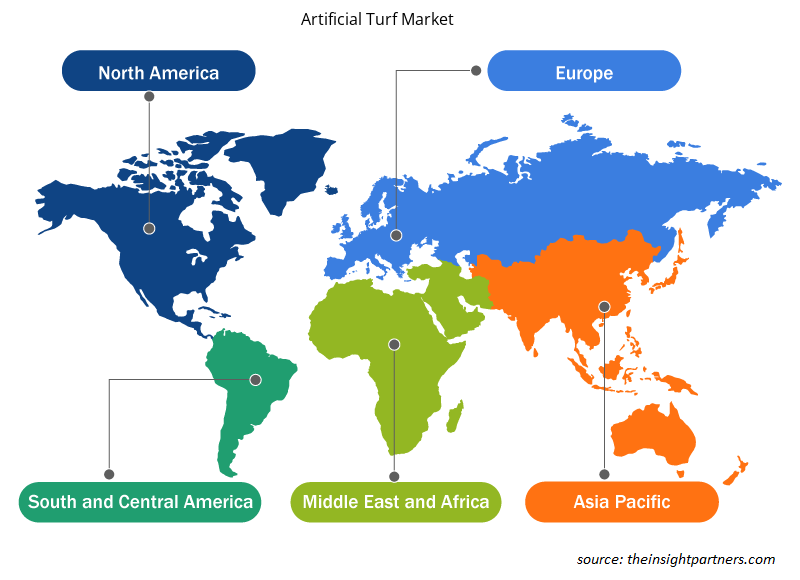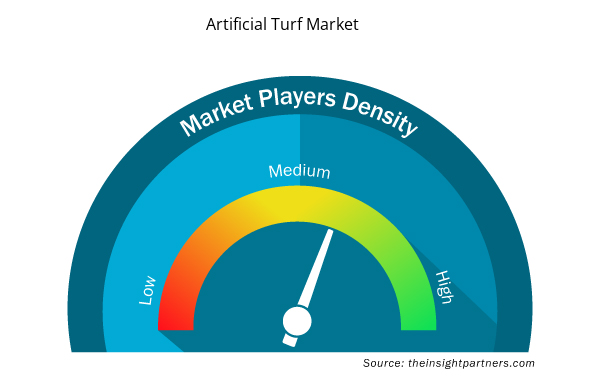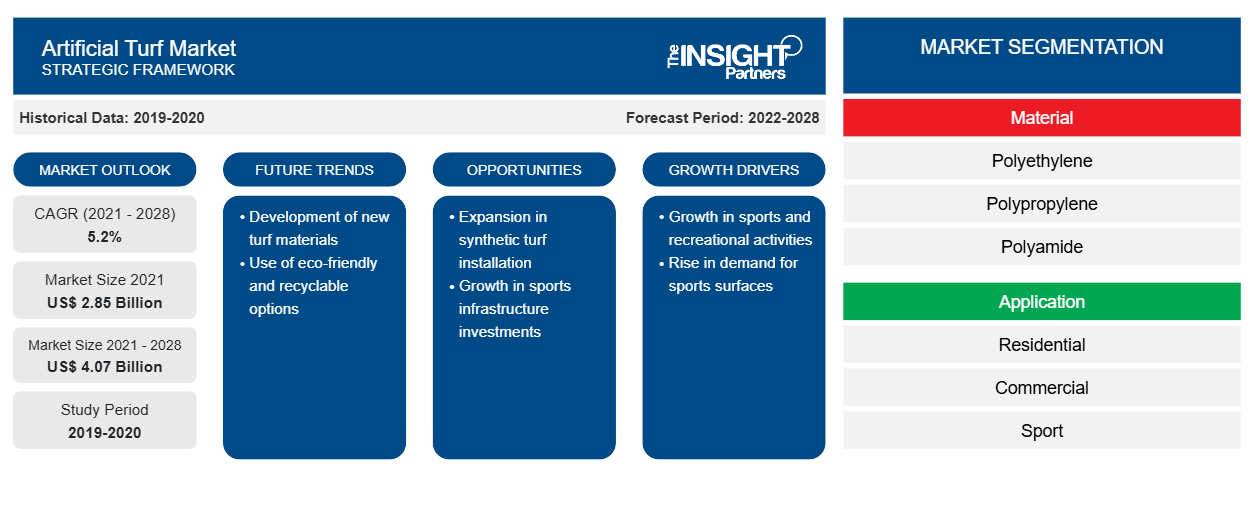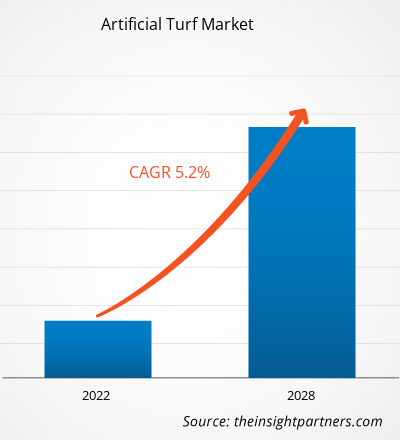Le marché du gazon artificiel a été évalué à 2 847,28 millions USD en 2021 et devrait atteindre 4 067,36 millions USD d'ici 2028. Il devrait croître à un TCAC de 5,2 % de 2021 à 2028.
Fabriqué à partir de fibres synthétiques, le gazon artificiel est conçu pour imiter l'herbe naturelle. Les matières premières pour la production de gazon artificiel comprennent le polyéthylène (PE), le polypropylène (PP), le polyamide (Nylon), les composés de caoutchouc, la mousse de polyester, différentes couleurs et d'autres additifs. La qualité des matières premières est essentielle pour la performance du gazon.
Le marché mondial du gazon artificiel est analysé sur la base du matériau, de l'application et de la géographie. En 2020, l'Asie-Pacifique détenait la plus grande part des revenus du marché mondial du gazon artificiel. Le principal facteur de croissance du marché du gazon artificiel en Asie-Pacifique est l'utilisation croissante du gazon artificiel dans le secteur domestique. Les divers avantages du gazon artificiel, tels qu'une moindre consommation d'eau et de produits chimiques, un faible entretien, aucune irrigation et une résistance aux intempéries, contribuent à une forte demande de gazon artificiel dans les installations sportives. En outre, la mondialisation croissante et la croissance du secteur de la construction favorisent également la croissance du marché du gazon artificiel. De plus, les acteurs du marché de cette région ont investi massivement dans des initiatives de R&D, contribuant au développement de plusieurs produits innovants, ce qui aide ce marché régional.
Personnalisez ce rapport en fonction de vos besoins
Vous bénéficierez d'une personnalisation gratuite de n'importe quel rapport, y compris de certaines parties de ce rapport, d'une analyse au niveau des pays, d'un pack de données Excel, ainsi que de superbes offres et réductions pour les start-ups et les universités.
- Obtenez les principales tendances clés du marché de ce rapport.Cet échantillon GRATUIT comprendra une analyse de données, allant des tendances du marché aux estimations et prévisions.
Impact de la pandémie de COVID-19 sur le marché du gazon artificiel
La pandémie de COVID-19 a posé des défis sans précédent à de nombreuses industries, notamment à l'industrie des produits chimiques et des matériaux. En raison du confinement national et des restrictions aux frontières, les chaînes d'approvisionnement ont été complètement perturbées. Cela a affecté la production et la distribution de divers produits. De nombreuses zones de loisirs et aires de jeux ont été fermées en raison du virus, ce qui a provoqué une augmentation des rénovations résidentielles dans le monde entier. Selon Synthetic Grass Warehouse, les entrepreneurs en gazon artificiel connaissent des gains de ventes allant jusqu'à 30 % par rapport à 2020. Les applications sur terrains de sport ont représenté 63 % du gazon installé en 2020 et devraient rester le plus grand domaine d'application au cours de la période de prévision. Cependant, le gazon dans les applications paysagères connaît une croissance rapide. Dans un avenir proche, les plateformes de commerce électronique devraient gagner un élan significatif dans la vente de divers produits essentiels et non essentiels, en particulier les gazons artificiels.
Informations sur le marché
Demande croissante de gazon artificiel de la part de l'industrie du sport et nombre croissant de stades
Le gazon artificiel convient à divers sports, mais il est couramment utilisé pour le baseball, le football, la crosse, le rugby et le soccer. En 2021, le Bank of America Stadium a décidé de passer du gazon naturel au gazon artificiel. Tepper Sports & Entertainment a annoncé qu'il abandonnerait le gazon au profit du FieldTurf avant la saison 2021 des Carolina Panthers. Le BC Place Stadium disposera également d'un nouveau terrain en gazon synthétique au Canada d'ici la fin janvier 2022. De plus, des terrains en gazon synthétique ont fait leur apparition dans les villes et les villages de pays comme l'Inde. Par conséquent, la demande croissante de gazon synthétique dans l'industrie du sport et le nombre croissant de stades utilisant du gazon synthétique stimulent considérablement le marché mondial du gazon synthétique.
Informations sur les applications
En fonction de l'application, le marché mondial du gazon artificiel a été segmenté en résidentiel, commercial et sportif. Le segment sportif détenait la plus grande part du marché mondial du gazon artificiel en 2020. Le gazon artificiel est largement utilisé dans les terrains de sport. Il est principalement utilisé pour fournir une surface adéquate pour les sports qui se pratiquent sur gazon dans les zones où l'entretien du gazon naturel est difficile ou ne peut pas pousser. La forte demande de gazon artificiel de la part de l'industrie du sport est principalement due à divers facteurs tels qu'un entretien facile, un temps de jeu plus long, etc.
Certains des principaux acteurs du marché mondial du gazon artificiel sont The Dow Chemical Company ; Tarkett ; Act Global ; CCGrass ; TenCate Grass ; SIS Pitches ; Victoria PLC ; GreenFields BV ; HATKO ; et Hellas Construction, Inc. Ces acteurs se concentrent principalement sur plusieurs stratégies, telles que le lancement de nouveaux produits, l'expansion et les fusions et acquisitions, pour leur expansion.
Aperçu régional du marché du gazon artificiel
Les tendances régionales et les facteurs influençant le marché du gazon artificiel tout au long de la période de prévision ont été expliqués en détail par les analystes d’Insight Partners. Cette section traite également des segments et de la géographie du marché du gazon artificiel en Amérique du Nord, en Europe, en Asie-Pacifique, au Moyen-Orient et en Afrique, ainsi qu’en Amérique du Sud et en Amérique centrale.

- Obtenez les données régionales spécifiques au marché du gazon artificiel
Portée du rapport sur le marché du gazon artificiel
| Attribut de rapport | Détails |
|---|---|
| Taille du marché en 2021 | 2,85 milliards de dollars américains |
| Taille du marché d'ici 2028 | 4,07 milliards de dollars américains |
| Taux de croissance annuel moyen mondial (2021-2028) | 5,2% |
| Données historiques | 2019-2020 |
| Période de prévision | 2022-2028 |
| Segments couverts | Par matériau
|
| Régions et pays couverts | Amérique du Nord
|
| Leaders du marché et profils d'entreprises clés |
|
Densité des acteurs du marché : comprendre son impact sur la dynamique des entreprises
Le marché du gazon artificiel connaît une croissance rapide, tirée par la demande croissante des utilisateurs finaux en raison de facteurs tels que l'évolution des préférences des consommateurs, les avancées technologiques et une plus grande sensibilisation aux avantages du produit. À mesure que la demande augmente, les entreprises élargissent leurs offres, innovent pour répondre aux besoins des consommateurs et capitalisent sur les tendances émergentes, ce qui alimente davantage la croissance du marché.
La densité des acteurs du marché fait référence à la répartition des entreprises ou des sociétés opérant sur un marché ou un secteur particulier. Elle indique le nombre de concurrents (acteurs du marché) présents sur un marché donné par rapport à sa taille ou à sa valeur marchande totale.
Les principales entreprises opérant sur le marché du gazon artificiel sont :
- La société Dow Chemical
- Tarkett
- Agir à l'échelle mondiale
- CCGrass
- Herbe TenCate
Avis de non-responsabilité : les sociétés répertoriées ci-dessus ne sont pas classées dans un ordre particulier.

- Obtenez un aperçu des principaux acteurs du marché du gazon artificiel
Rapports en vedette
- Tendances industrielles progressistes sur le marché du gazon artificiel pour aider les acteurs à développer des stratégies efficaces à long terme
- Stratégies de croissance des entreprises adoptées par les marchés développés et en développement
- Analyse quantitative du marché du gazon synthétique de 2019 à 2028
- Estimation de la demande mondiale de gazon artificiel
- Analyse des cinq forces de Porter pour illustrer l'efficacité des acheteurs et des fournisseurs opérant dans l'industrie
- Développements récents pour comprendre le scénario concurrentiel du marché
- Tendances et perspectives du marché ainsi que facteurs qui stimulent et freinent la croissance du marché du gazon artificiel
- Aide à la prise de décision en mettant en évidence les stratégies de marché qui sous-tendent l'intérêt commercial, conduisant à la croissance du marché
- La taille du marché du gazon artificiel à différents niveaux
- Aperçu détaillé et segmentation du marché, ainsi que de la dynamique de l'industrie du gazon artificiel
- Taille du marché du gazon artificiel dans diverses régions avec des opportunités de croissance prometteuses
Marché mondial du gazon artificiel
Matériel
- Polyéthylène
- Polypropylène
- Polyamide
- Autres
Application
- Résidentiel
- Commercial
- Sport
Profils d'entreprise
- La société Dow Chemical
- Tarkett
- Agir à l'échelle mondiale
- CCGrass
- Herbe TenCate
- Emplacements SIS
- Société par actions de Victoria
- GreenFields BV
- HATKO
- Hellas Construction, Inc.
- Analyse historique (2 ans), année de base, prévision (7 ans) avec TCAC
- Analyse PEST et SWO
- Taille du marché Valeur / Volume - Mondial, Régional, Pays
- Industrie et paysage concurrentiel
- Ensemble de données Excel


- Underwater Connector Market
- Electronic Signature Software Market
- Virtual Pipeline Systems Market
- Ceiling Fans Market
- Joint Pain Injection Market
- Aerospace Forging Market
- Unit Heater Market
- Quantitative Structure-Activity Relationship (QSAR) Market
- Predictive Maintenance Market
- Foot Orthotic Insoles Market

Report Coverage
Revenue forecast, Company Analysis, Industry landscape, Growth factors, and Trends

Segment Covered
This text is related
to segments covered.

Regional Scope
North America, Europe, Asia Pacific, Middle East & Africa, South & Central America

Country Scope
This text is related
to country scope.
Questions fréquemment posées
Europe is estimated to register the fastest CAGR in the global artificial turf market over the forecast period. With the presence of various artificial turf brands, Europe has been one of the key regions for the global artificial turf market. Europe is anticipated to witness a growing demand for artificial turf during the forecast period, owing to the increasing number of stadiums in the region.
The sports segment held the largest share of the artificial turf market in 2021. It is one of the most crucial application segments of artificial turf and is most often used for baseball, football, rugby, soccer, lacrosse, and others.
The sports segment is the fastest-growing segment in the global artificial turf market during the forecasted period. Artificial turf is also commonly used in sports stadiums and arenas. There is a high demand for artificial turf from the sports industry due to easy maintenance and more playing time.
The polyethylene segment held the largest share of the global artificial turf market in 2021. Polyethylene is one of the most commonly used materials in the artificial turf industry. Polyethylene grass is ideal for front and backyard applications, sports, and pets due to a combination of softness, realism, and the lack of moisture absorption.
The major players operating in the global artificial turf market are The Dow Chemical Company; Tarkett; Act Global; CCGrass; TenCate Grass; SIS Pitches; Victoria PLC; GreenFields BV; HATKO; Hellas Construction, Inc.; among others.
In 2021, Asia Pacific held the largest share of the global artificial turf market. In Asia-Pacific, the demand for artificial turf is increasing, mainly due to the rising use of artificial turf in the residential sector. Moreover, the rise in residential and commercial infrastructural facilities across the region is driving market growth.
Trends and growth analysis reports related to Chemicals and Materials : READ MORE..
The List of Companies - Artificial Turf Market
- The Dow Chemical Company
- Tarkett
- Act Global
- CCGrass
- TenCate Grass
- SIS Pitches
- Victoria PLC
- GreenFields BV
- HATKO
- Hellas Construction, Inc.
The Insight Partners performs research in 4 major stages: Data Collection & Secondary Research, Primary Research, Data Analysis and Data Triangulation & Final Review.
- Data Collection and Secondary Research:
As a market research and consulting firm operating from a decade, we have published and advised several client across the globe. First step for any study will start with an assessment of currently available data and insights from existing reports. Further, historical and current market information is collected from Investor Presentations, Annual Reports, SEC Filings, etc., and other information related to company’s performance and market positioning are gathered from Paid Databases (Factiva, Hoovers, and Reuters) and various other publications available in public domain.
Several associations trade associates, technical forums, institutes, societies and organization are accessed to gain technical as well as market related insights through their publications such as research papers, blogs and press releases related to the studies are referred to get cues about the market. Further, white papers, journals, magazines, and other news articles published in last 3 years are scrutinized and analyzed to understand the current market trends.
- Primary Research:
The primarily interview analysis comprise of data obtained from industry participants interview and answers to survey questions gathered by in-house primary team.
For primary research, interviews are conducted with industry experts/CEOs/Marketing Managers/VPs/Subject Matter Experts from both demand and supply side to get a 360-degree view of the market. The primary team conducts several interviews based on the complexity of the markets to understand the various market trends and dynamics which makes research more credible and precise.
A typical research interview fulfils the following functions:
- Provides first-hand information on the market size, market trends, growth trends, competitive landscape, and outlook
- Validates and strengthens in-house secondary research findings
- Develops the analysis team’s expertise and market understanding
Primary research involves email interactions and telephone interviews for each market, category, segment, and sub-segment across geographies. The participants who typically take part in such a process include, but are not limited to:
- Industry participants: VPs, business development managers, market intelligence managers and national sales managers
- Outside experts: Valuation experts, research analysts and key opinion leaders specializing in the electronics and semiconductor industry.
Below is the breakup of our primary respondents by company, designation, and region:

Once we receive the confirmation from primary research sources or primary respondents, we finalize the base year market estimation and forecast the data as per the macroeconomic and microeconomic factors assessed during data collection.
- Data Analysis:
Once data is validated through both secondary as well as primary respondents, we finalize the market estimations by hypothesis formulation and factor analysis at regional and country level.
- Macro-Economic Factor Analysis:
We analyse macroeconomic indicators such the gross domestic product (GDP), increase in the demand for goods and services across industries, technological advancement, regional economic growth, governmental policies, the influence of COVID-19, PEST analysis, and other aspects. This analysis aids in setting benchmarks for various nations/regions and approximating market splits. Additionally, the general trend of the aforementioned components aid in determining the market's development possibilities.
- Country Level Data:
Various factors that are especially aligned to the country are taken into account to determine the market size for a certain area and country, including the presence of vendors, such as headquarters and offices, the country's GDP, demand patterns, and industry growth. To comprehend the market dynamics for the nation, a number of growth variables, inhibitors, application areas, and current market trends are researched. The aforementioned elements aid in determining the country's overall market's growth potential.
- Company Profile:
The “Table of Contents” is formulated by listing and analyzing more than 25 - 30 companies operating in the market ecosystem across geographies. However, we profile only 10 companies as a standard practice in our syndicate reports. These 10 companies comprise leading, emerging, and regional players. Nonetheless, our analysis is not restricted to the 10 listed companies, we also analyze other companies present in the market to develop a holistic view and understand the prevailing trends. The “Company Profiles” section in the report covers key facts, business description, products & services, financial information, SWOT analysis, and key developments. The financial information presented is extracted from the annual reports and official documents of the publicly listed companies. Upon collecting the information for the sections of respective companies, we verify them via various primary sources and then compile the data in respective company profiles. The company level information helps us in deriving the base number as well as in forecasting the market size.
- Developing Base Number:
Aggregation of sales statistics (2020-2022) and macro-economic factor, and other secondary and primary research insights are utilized to arrive at base number and related market shares for 2022. The data gaps are identified in this step and relevant market data is analyzed, collected from paid primary interviews or databases. On finalizing the base year market size, forecasts are developed on the basis of macro-economic, industry and market growth factors and company level analysis.
- Data Triangulation and Final Review:
The market findings and base year market size calculations are validated from supply as well as demand side. Demand side validations are based on macro-economic factor analysis and benchmarks for respective regions and countries. In case of supply side validations, revenues of major companies are estimated (in case not available) based on industry benchmark, approximate number of employees, product portfolio, and primary interviews revenues are gathered. Further revenue from target product/service segment is assessed to avoid overshooting of market statistics. In case of heavy deviations between supply and demand side values, all thes steps are repeated to achieve synchronization.
We follow an iterative model, wherein we share our research findings with Subject Matter Experts (SME’s) and Key Opinion Leaders (KOLs) until consensus view of the market is not formulated – this model negates any drastic deviation in the opinions of experts. Only validated and universally acceptable research findings are quoted in our reports.
We have important check points that we use to validate our research findings – which we call – data triangulation, where we validate the information, we generate from secondary sources with primary interviews and then we re-validate with our internal data bases and Subject matter experts. This comprehensive model enables us to deliver high quality, reliable data in shortest possible time.


 Obtenez un échantillon gratuit pour ce rapport
Obtenez un échantillon gratuit pour ce rapport